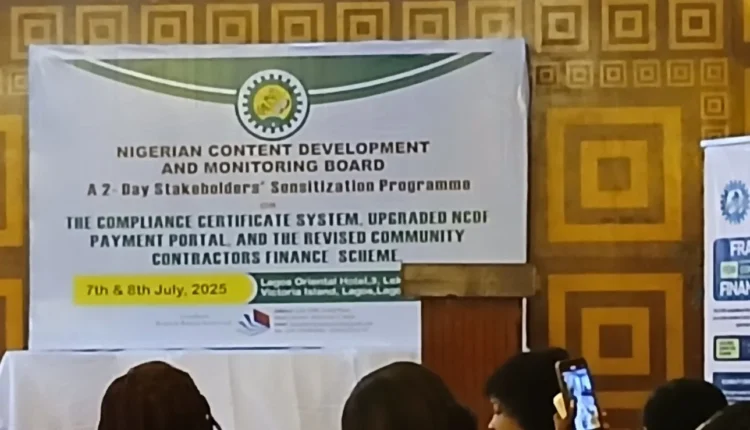The Nigerian Content Development and Monitoring Board (NCDMB) has launched a sensitisation campaign to educate contractors and stakeholders on the Nigerian Content Compliance Certificate (NCCC) system—its latest regulatory mechanism for enforcing local content compliance in the oil and gas sector.
Speaking during a two-day sensitisation programme held in Lagos on Tuesday, the Executive Secretary of NCDMB, Mr. Felix Omatsola, described the initiative as a strategic step toward deepening Nigerian Content and promoting transparency and accountability across the industry. He was represented by Mr. Mubarak Zubair, Acting Director of Finance and Personnel Management.
Omatsola stated, “The Compliance Certificate System was developed to ensure Nigerian Content requirements are met in all oil and gas projects.
“With this new system, companies now have a clear, objective standard for demonstrating compliance, while the Board enhances its regulatory oversight capabilities.”
He stressed the importance of stakeholder education in the successful implementation of the initiative.
“This programme is more than a workshop; it is a reaffirmation of our commitment to expand Nigerian Content and improve access to funding mechanisms that support indigenous participation,” he added.
According to the Executive Secretary, the programme focused on several key elements, including the compliance certificate system, the upgraded Nigerian Content Development Fund (NCDF) Payment Portal, the revised Community Contractors Finance Scheme, and updates on the Nigerian Content Intervention (NCI) Fund.
Highlighting improvements in the NCDF Payment Portal, Omatsola said it now features a more user-friendly interface, simplified remittance processes, and real-time compliance tracking—all aimed at supporting increased inflows as the certification process gains traction.
He also introduced the revised Community Contractors Finance Scheme, developed in collaboration with First City Monument Bank (FCMB) and other financial institutions, to support host community contractors.
“This initiative is directly aligned with our goal of enabling shared prosperity and inclusive growth within the oil and gas ecosystem,” he noted.
Omatsola further addressed the impact of the $400 million Nigerian Content Intervention Fund, managed in partnership with the Bank of Industry (BoI) and NEXIM Bank, which has supported over 130 companies across various product lines.
“Work is ongoing to expand access and ensure even more indigenous businesses can tap into these vital financial resources,” he said.
He urged all participants to take full advantage of the sensitisation sessions: “As we proceed, I urge you to participate actively; ask questions, share your insights, and take full advantage of the expertise provided by our facilitators.”
Omatsola also commended the Board’s partners—Vascon Solutions, FCMB, NEXIM Bank, BoI, and the implementing consultants—for their continued collaboration and support.
“Together, we are building systems and solutions that serve not only today’s needs but also the future of Nigerian Content,” he concluded.
According to the News Agency of Nigeria (NAN), the event drew over 200 participants from companies operating in Lagos, Port Harcourt, Warri, Bayelsa, and other oil-producing regions.



[…] Tel al-Hawa, southwest of Gaza City, four people — including an infant — died when an Israeli airstrike leveled a house, Al-Shifa Hospital […]